- Clone
- G034E3 (See other available formats)
- Regulatory Status
- RUO
- Other Names
- BN-1, CKR6, DCR2, CKRL3, DRY-6, GPR29, CKR-L3, CMKBR6, GPRCY4, STRL22, GPR-CY4
- Isotype
- Mouse IgG2b, κ
- Ave. Rating
- Submit a Review
- Product Citations
- publications
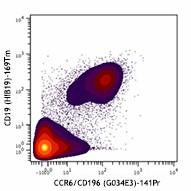
-

Human PBMCs stained with 169Tm-anti-CD19 (HIB19) and 141Pr-anti-CD196 (G034E3). CD45+ CD33- cells are displayed in the analysis. Data provided by DVS Sciences.
CCR6, also known as CD196, is a chemokine receptor that is expressed on immature dendritic cells, B lymphocytes, and memory T cells. CCR6 binds CCL20, although members of the β defensin family also bind CCR6 with a lower affinity. CCR6 positive cells, and its ligand CCL20, have been detected in numerous organs, especially the secondary lymphoid organ. CCL20 is selectively made by the follicle-associated epithelium (FAE) overlying Peyers Patches (PPs) and isolated lymphoid follicles (ILFs). CCL20 contributes to the recruitment of CCR6-expressing B cells to these structures. In humans, CCR6 can function to mediate arrest of T cells on dermal endothelial cells and is highly expressed on T cells resident in both normal and psoriatic skin. CCR6 and/or CCL20 have been implicated in the pathogenesis of rheumatoid arthritis and inflammatory bowel disease. Human T cells that are able to produce IL-17 express CCR6. It suggests that CCL20 and CCR6 have a role in inflammatory diseases by recruiting Th17 cells to target tissues.
Product DetailsProduct Details
- Verified Reactivity
- Human, Cynomolgus, Rhesus
- Reported Reactivity
- African Green, Baboon
- Antibody Type
- Monoclonal
- Host Species
- Mouse
- Immunogen
- CCR6-transfected cells
- Formulation
- Phosphate-buffered solution, pH 7.2, containing 0.09% sodium azide and EDTA.
- Preparation
- The antibody was purified by affinity chromatography.
- Concentration
- 1.0 mg/ml
- Storage & Handling
- The antibody solution should be stored undiluted between 2°C and 8°C.
- Application
-
FC - Quality tested
CyTOF® - Verified - Recommended Usage
-
This product is suitable for use with the Maxpar® Metal Labeling Kits. For metal labeling using Maxpar® Ready antibodies, proceed directly to the step to Partially Reduce the Antibody by adding 100 µl of Maxpar® Ready antibody to 100 µl of 4 mM TCEP-R in a 50 kDa filter and continue with the protocol. Always refer to the latest version of Maxpar® User Guide when conjugating Maxpar® Ready antibodies.
- Additional Product Notes
-
Maxpar® is a registered trademark of Standard BioTools Inc.
- Product Citations
-
- RRID
-
AB_2563725 (BioLegend Cat. No. 353427)
Antigen Details
- Structure
- Chemokine receptor, GPCR, seven transmembrane receptor
- Distribution
-
Immature dendritic cells, B lymphocytes, memory T cells, Th17 cells
- Function
- Host defense, important for recruitment of B cells to secondary lymphoid organs, mediates arrest of T cells on dermal endothelial cells
- Ligand/Receptor
- CCL20 (MIP-3α)
- Cell Type
- B cells, Dendritic cells, T cells, Th17
- Biology Area
- Immunology
- Molecular Family
- CD Molecules, Cytokine/Chemokine Receptors, GPCR
- Antigen References
-
1. Zaballos A, et al. 1996. Biochem. Bioph. Res. Co. 227:846.
2. Yang D, et al. 1999. Science 286:525.
3. MacDonald KG, et al. 2007. Am. J. Pathol. 170:1229.
4. Homey B, et al. 2000. J. Immunol. 164:6621.
5. Hirota K, et al. 2007. J. Exp. Med. 204:2803.
6. Singh SP, et al. 2008. J. Immunol. 180:214. - Gene ID
- 1235 View all products for this Gene ID
- UniProt
- View information about CD196 on UniProt.org
Related FAQs
- Does staining at room temperature or even at 37°C help for checking chemokine receptors expression?
-
Due to continuous recycling of many chemokine receptors, it may be worthwhile to consider staining at room temperature or at 37°C if the staining at lower temperature (which can potentially reduce receptor turnover) is not optimal.
- Can I obtain CyTOF data related to your Maxpar® Ready antibody clones?
-
We do not test our antibodies by mass cytometry or on a CyTOF machine in-house. The data displayed on our website is provided by Fluidigm®. Please contact Fluidigm® directly for additional data and further details.
- Can I use Maxpar® Ready format clones for flow cytometry staining?
-
We have not tested the Maxpar® Ready antibodies formulated in solution containing EDTA for flow cytometry staining. While it is likely that this will work in majority of the situations, it is best to use the non-EDTA formulated version of the same clone for flow cytometry testing. The presence of EDTA in some situations might negatively affect staining.
- I am having difficulty observing a signal after conjugating a metal tag to your Maxpar® antibody. Please help troubleshoot.
-
We only supply the antibody and not test that in house. Please contact Fluidigm® directly for troubleshooting advice: http://techsupport.fluidigm.com/
- Is there a difference between buffer formulations related to Maxpar® Ready and purified format antibodies?
-
The Maxpar® Ready format antibody clones are formulated in Phosphate-buffered solution, pH 7.2, containing 0.09% sodium azide and EDTA. The regular purified format clones are formulated in solution that does not contain any EDTA. Both formulations are however without any extra carrier proteins.
Other Formats
View All CD196 Reagents Request Custom ConjugationCustomers Also Purchased
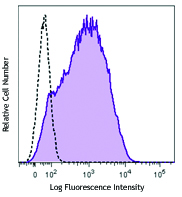
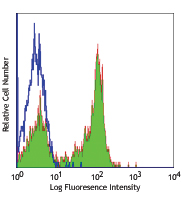
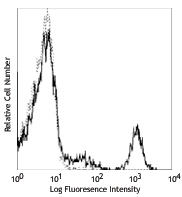
Compare Data Across All Formats
This data display is provided for general comparisons between formats.
Your actual data may vary due to variations in samples, target cells, instruments and their settings, staining conditions, and other factors.
If you need assistance with selecting the best format contact our expert technical support team.
-
Purified anti-human CD196 (CCR6)
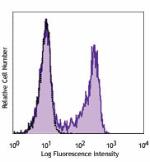
Human peripheral lymphocytes were stained with purified CCR6... -
Alexa Fluor® 647 anti-human CD196 (CCR6)
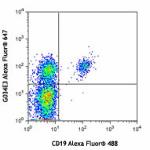
Human peripheral lymphocytes were stained with CD19 Alexa Fl... 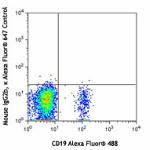
-
Brilliant Violet 421™ anti-human CD196 (CCR6)
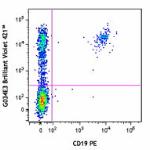
Human peripheral blood lymphocytes stained with CD19 PE and ... 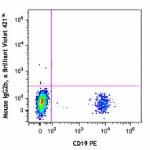
-
PerCP/Cyanine5.5 anti-human CD196 (CCR6)

Human peripheral lymphocytes were stained with CD19 APC and ... -
PE anti-human CD196 (CCR6)
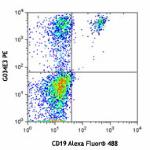
Human peripheral lymphocytes were stained with CD19 Alexa Fl... 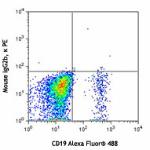
-
FITC anti-human CD196 (CCR6)
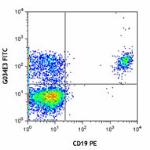
Human peripheral lymphocytes were stained with CD19 PE and C... 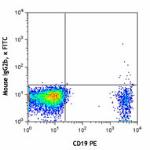
-
Alexa Fluor® 488 anti-human CD196 (CCR6)
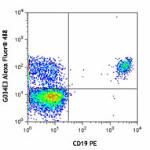
Human peripheral lymphocytes were stained with CD19 PE and C... 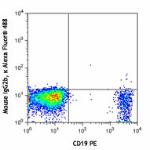
-
APC anti-human CD196 (CCR6)
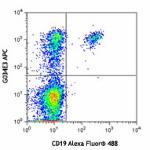
Human peripheral lymphocytes were stained with CD19 Alexa Fl... 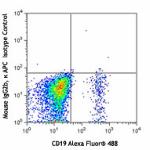
-
PE/Cyanine7 anti-human CD196 (CCR6)

Human peripheral lymphocytes were stained with CD19 Alexa Fl... -
Brilliant Violet 605™ anti-human CD196 (CCR6)
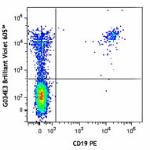
Human peripheral blood lymphocytes were stained with CD19 PE... -
Brilliant Violet 785™ anti-human CD196 (CCR6)
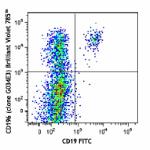
Human peripheral blood lymphocytes were stained with CD19 FI... -
Brilliant Violet 510™ anti-human CD196 (CCR6)
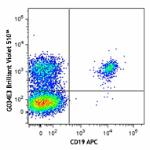
Human peripheral blood lymphocytes were stained with CD19 AP... 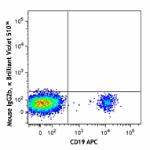
-
Brilliant Violet 650™ anti-human CD196 (CCR6)
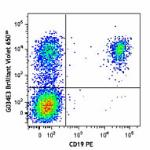
Human peripheral lymphocytes were stained with CD19 PE and C... 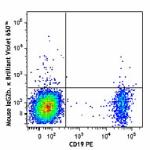
-
Purified anti-human CD196 (CCR6) (Maxpar® Ready)
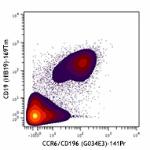
Human PBMCs stained with 169Tm-anti-CD19 (HIB19) and 141Pr-a... -
PE/Dazzle™ 594 anti-human CD196 (CCR6)
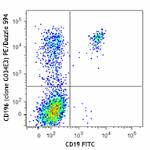
Human peripheral blood lymphocytes were stained with CD19 FI... 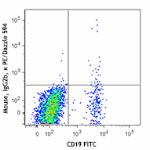
-
APC/Cyanine7 anti-human CD196 (CCR6)

Human peripheral blood lymphocytes were stained with CD19 FI... -
Alexa Fluor® 700 anti-human CD196 (CCR6)
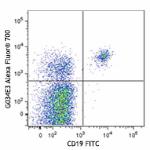
Human peripheral blood lymphocytes were stained with CD19 FI... 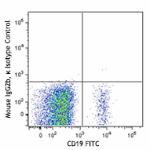
-
Brilliant Violet 711™ anti-human CD196 (CCR6)
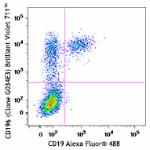
Human peripheral blood lymphocytes were stained with CD19 Al... 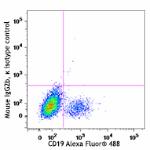
-
TotalSeq™-A0143 anti-human CD196 (CCR6)
-
Pacific Blue™ anti-human CD196 (CCR6)

Human peripheral lymphocytes were stained with CD19 FITC and... -
TotalSeq™-C0143 anti-human CD196 (CCR6)
-
APC/Fire™ 750 anti-human CD196 (CCR6)

Human peripheral blood lymphocytes were stained with CD19 FI... -
TotalSeq™-B0143 anti-human CD196 (CCR6)
-
TotalSeq™-D0143 anti-human CD196 (CCR6)
-
PE/Fire™ 640 anti-human CD196 (CCR6)

Human peripheral blood lymphocytes were stained with anti-hu... -
APC/Fire™ 810 anti-human CD196 (CCR6)

Human peripheral blood lymphocytes were stained with anti-hu... -
Spark NIR™ 685 anti-human CD196 (CCR6)

Human peripheral blood lymphocytes were stained with anti-hu... -
PE/Fire™ 700 anti-human CD196 (CCR6)

Human peripheral blood lymphocytes were stained with anti-hu... -
PE/Cyanine5 anti-human CD196 (CCR6)

Human peripheral blood lymphocytes were stained with anti-hu... -
Biotin anti-human CD196 (CCR6)

Human peripheral lymphocytes were stained with anti-human CD... -
PE/Fire™ 810 anti-human CD196 (CCR6)

Human peripheral blood lymphocytes were stained with anti-hu... -
PE/Fire™ 744 anti-human CD196 (CCR6)

Human peripheral blood lymphocytes were stained with anti-hu... -
PerCP/Fire™ 780 anti-human CD196 (CCR6) Antibody

Human peripheral blood lymphocytes were stained with anti-hu... -
Spark PLUS UV395™ anti-human CD196 (CCR6)

Human peripheral blood lymphocytes were stained with anti-hu... -
PerCP/Fire™ 806 anti-human CD196 (CCR6)

Human peripheral blood lymphocytes were stained with anti-hu...











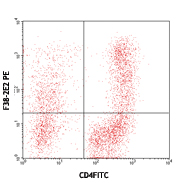



Follow Us